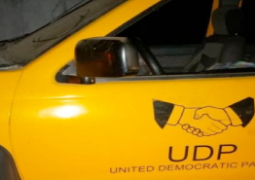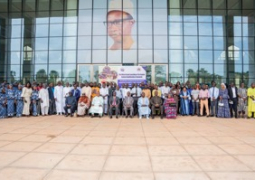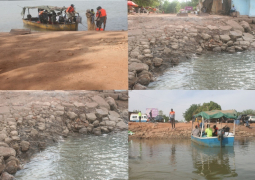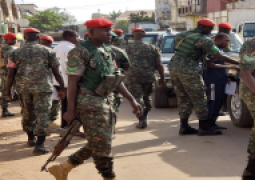I woke up to a very wet and somber early morning of July 31st, 1981. Like I would usually do, I performed my Fajr prayers then tuned into the radio for the latest local and international news.
An announcement of what seemed to be a coup d’état was aired over Radio Gambia. Even though the message was not very clear at the first instance, but having lived in Guinea Bissau and witnessed few events of that nature, I was convinced from that moment that this was a coup d’état.
Not long after the announcement, there was pandemonium and panic all over the greater Banjul area because events of such nature were quite alien to our peaceful and beloved country. There was no prior knowledge or experience as to how to handle a situation like this. People thronged the streets to find out what happened. Not long after, it became apparent to all that this was indeed a coup d’état.
This event was unfolding whilst President Sir Dawda was in London where he was a guest of the British government celebrating the royal wedding of Prince Charles Windsor and Lady Diana Spencer.
The leader of the coup d’état was Kukoi Samba Sanyang. He was born Dominique Paul Sanyang in the early ’50s to a Roman Catholic Jola family in the village of Wassadou in the Foni Kansalla District. Between 1974 and 1976, Kukoi was sent by the Roman Catholic Mission in the Gambia to a seminary in Senegal to study theology. In 1977, Kukoi contested the Parliamentary elections on National Convention Party (NCP) ticket and lost to the People’s Progressive Party (PPP) candidate Ismaila Jammeh.
Immediately after losing the elections, Kukoi left the country for the unknown. He later returned to the Gambia and joined the Gambia Socialist Revolutionary Party (GSRP) formed by Gibril ‘Pengu’ George. The core of Kukoi’s small team was predominantly from Sutu Sinjang/Bata Butu in the Foni Berefet District in the then Western Division but based in Tallinding Kunjang in Kanifing Area.
After the banning of the GSRP, Gibril ‘Pengu’ George changed the name to Gambia Underground Socialist Revolutionary Workers Party (GUSRWP). The newfound GUSRWP was largely believed to have played a big role in the planning and execution of the 1981 coup d’état.
Another prominent figure who played a role in the mutiny was Alieu Kah. He was a successful businessman, a financial protégé of Gibril Pengu George, and the manager of the famous Super Eagles band. Just like Matarr Sarr, Alieu Kah was also disgruntled by the complete domination of the business environment by foreigners at the expense of the indigenous businessmen. Government tenders were seen as façade and mostly tailored to favour foreign business outfits.
The infamous 1981 coup was staged on July 31st, 1981 aided by some dissatisfied staff of the Gambia Field Force, members of the Movement for Justice in Africa (MOJA-Gambia), and some angry and disadvantaged youths who were reeling from the economic hardship and dwindling living conditions in the Gambia at the time. Both GSRP and MOJA-Gambia were identified as subversive organisations and banned in 1980 by the Gambia government.
On the eve of the coup detat, Kukoi and his men attacked the Field Force depot in Bakau and broke into the armoury with the help of an officer called Momodou Sonko. Armed with AK47 rifles, they were joined by a good chunk of the Field Force officers including Ousman Bojang. He was a marksman and a native of Janjanbureh. Ousman Bojang’s first casualty in the mutiny was Kikala Jallow who was shot and killed in his house at Bakau. Kikala Jallow was Assistant Commander of the Gambia Field Force and also a loyalist.
The rebels advanced swiftly to close the land, air, and sea borders. Martial law was soon introduced. Radio Gambia was firmly in the hand of the rebels and Cable and Wireless which was the country’s only means of telecommunication was disabled. This was done around midday so the vice President-Assan Musa Camara was lucky to talk to Sir Dawda and briefed him of the situation on the ground just in the nick of time. That communication would later prove to be very crucial as it laid out the plans to deal with the situation.
Realising the growing support of the mutiny, Kukoi enjoined all able-bodied men to go to the Field Force depot to take up arms. The response was overwhelming. Most of these young men have never seen guns before and could barely handle them, but nonetheless, they responded to the call out of frustration, anger, and criminal intentions.
Some were in it just for the fun whilst some others were scrambling for money; breaking shops and looting safe boxes, cash box, and anything of value they can lay their hands on. Almost all the alcohol and liquor stores were broken into and looted. Alcohol became available from that moment and soon after that most of the gunmen were drunk.
This marked the beginning of the mass shooting and the indiscriminate killing of innocent people in the streets of Banjul, Bakau, Serrekunda, and Brikama by the rebels for no reason other than being in the wrong place at the wrong time. The shooting was so intense in the streets of Banjul that some were killed by stray bullets in their houses.
The late Alieu Sallah comes to mind for bringing untold anguish to families of Banjul. He would play rhythmic and captivating tunes with his trumpet to lure unsuspecting people to the streets only to execute them.
Dead bodies were littered all over the streets of Banjul. There was lawlessness and total anarchy. The vice president Assan Musa Camara, Saihou Sabally, Lamin Saho, and Lamin Kitty Jarbang along with some senior civil servants were the notable and high-profile members of the Jawara administration who sought sanctuary at the Police Headquarters under the protection of the Inspector General of Police-Abdoulie Sulayman Mboob. A veteran ex-serviceman Sergeant Ousman Jallow who saw action at Burma in the 1939-1945 war also volunteered to reinforce the safety of the vice president and in the process gave a brilliant account of himself.
As the shooting continued it became clear that the coup was not thoroughly planned, the execution was uncoordinated and there was outright lack of control. Trust was dissipating gradually among the coupe leaders. Whilst Gibril Pengu George was permanently stationed at the Field Force Depot, Kukoi was not comfortable being in one place. He was crisscrossing the greater Banjul area with a team of his core and loyal men as human shields because of the perceived danger to his life not only by the loyal forces but by his circle of rebels. This situation culminated in the execution of Gibril ‘Pengu’ George at the Field Force Depot in Bakau.
Due to his strong Christian faith and ostensible ties with the Roman Catholic Mission, the diocese had to out-rightly disassociate itself from the mutiny and the consequential actions of Kukoi in order to avoid being labelled as either accomplice or sympathizer.
Sir Dawda arrived in Dakar on the 1st of August 1981 and continued negotiations with his Senegalese counterpart President Abdou Diouf to facilitate his return. There was already a Mutual Defense Agreement of 1967 that the Gambia could rely on to trigger the deployment of the Senegalese forces to quell the insurgency.
Bakary Bunja Darboe was the Gambia’s High Commissioner to Senegal at the time. The situation needed meticulous coordination and execution and Mr. Darboe was available to do just that. His intervention was crucial in the events that led to Sir Dawda invoking the Mutual Defense Agreement of 1967 between the Gambia and Senegal which ultimately led to the deployment of the Senegalese troops to the Gambia.
The following day on the 1st of August 1981 at around mid-day, the Senegalese troops were seen in strategic locations all over the country such as the Barra-Banjul ferry terminal and the airport where they were battling with the rebels.
They found pockets of resistance on the ground. The intervention of the Senegalese forces angered the rebels and they went wild. They attacked and captured the State House leaving so many casualties. Among those who died in the fierce battle at State House was Ousman Bojang.
The rebels overcame the loyalists and took away Lady Chilel Jawara and the President’s children as hostage. According to Lady Chilel, she was forced to appeal to her husband Sir Dawda to step down as president of the Republic of the Gambia.
This was followed by a wholesale and calculated arrest of people from all over the country. The hostages were detained at the Field Force Depot in Bakau. Prominent amongst them were Serign Habib Sey (Senegalese grand Marabout), the late Sanjally Bojang (chief and revered elder), Sheriffo Jawara (elder brother of Sir Dawda), Dembo Jatta (former cabinet minister), Saidou Nourou Ba (a Senegalese diplomat and the last Executive Secretary of the erstwhile Senegambia Confederation). Most of these people were forced to either denounce Sir Dawda and his government or to implore President Abdou Diouf to withdraw the Senegalese forces in the Gambia.
Former Police commander Janko Tambajangs’ mother was captured by the rebels and coerced to appeal to her son to stop killing their men. Mr. Tambajang was a gallant police officer who put up great resistance against the insurgents during the 1981 attempted coup.
The hostage-taking spree did not yield the desired result because both heads of state were resolute in their quest to quell the mutiny.
Sir Dawda appealed to the British government for assistance to quell the mutiny. His request was granted albeit unannounced. Major Ian Crooke was identified to lead a small team of SAS commandos that fought separately from the Senegalese troops. The primary preoccupation of the SAS was to rescue Sir Dawda’s family. Soon after the SAS joined the fray, they overcame the rebels and rescued the president’s family and other hostages from the Medical Research Council (MRC) where the first lady was taken for treatment.
By the 2nd of August 1981, the situation was largely under control. Sir Dawada flew in from Dakar and was immediately whisked to the Senegalese High Commission in Banjul where he made his first statement to the Gambian people in a bid to restore confidence and maintain public order. From that moment, it was safe to say that Sir Dawda’s government was reinstated.
Weakened Kukoi abandoned the fight and manoeuvred his way out of the country through Kartong in Western Division and into Guinea Bissau with few men. He finally ended up in Libya where he lived in exile. Kukoi died in Mali on the 18th of June 2013. He was later laid to rest in Senegal because the Jammeh administration would not allow the repatriation of his body back to the Gambia for burial.
This event is remembered not only as the first attempt to overthrow the democratically elected government of President Sir Dawda Kairaba Jawara, but it also compounded the effects of the economic hardship that resulted from the global recession coupled with four years of poor rains for an economy that depended on peanut as the mainstay of the economy. All the major business outfits in the country included Maurel and Prom were either ransacked, looted and/or burnt.
The impact was quite disturbing in many ways as the social-economic fibres of the country was in ruins.
Alhagie Baa Musa Trawally
Eye witness





